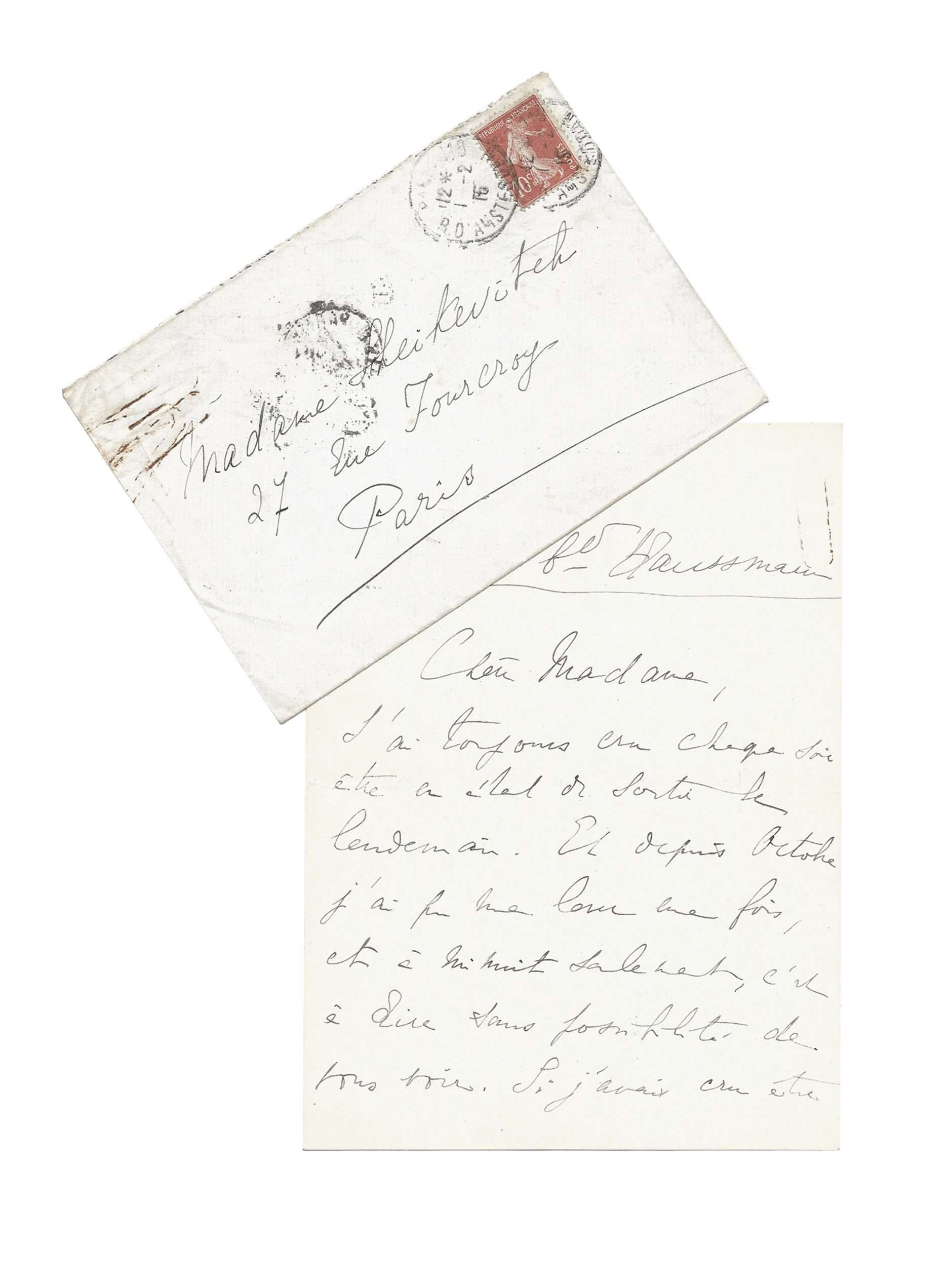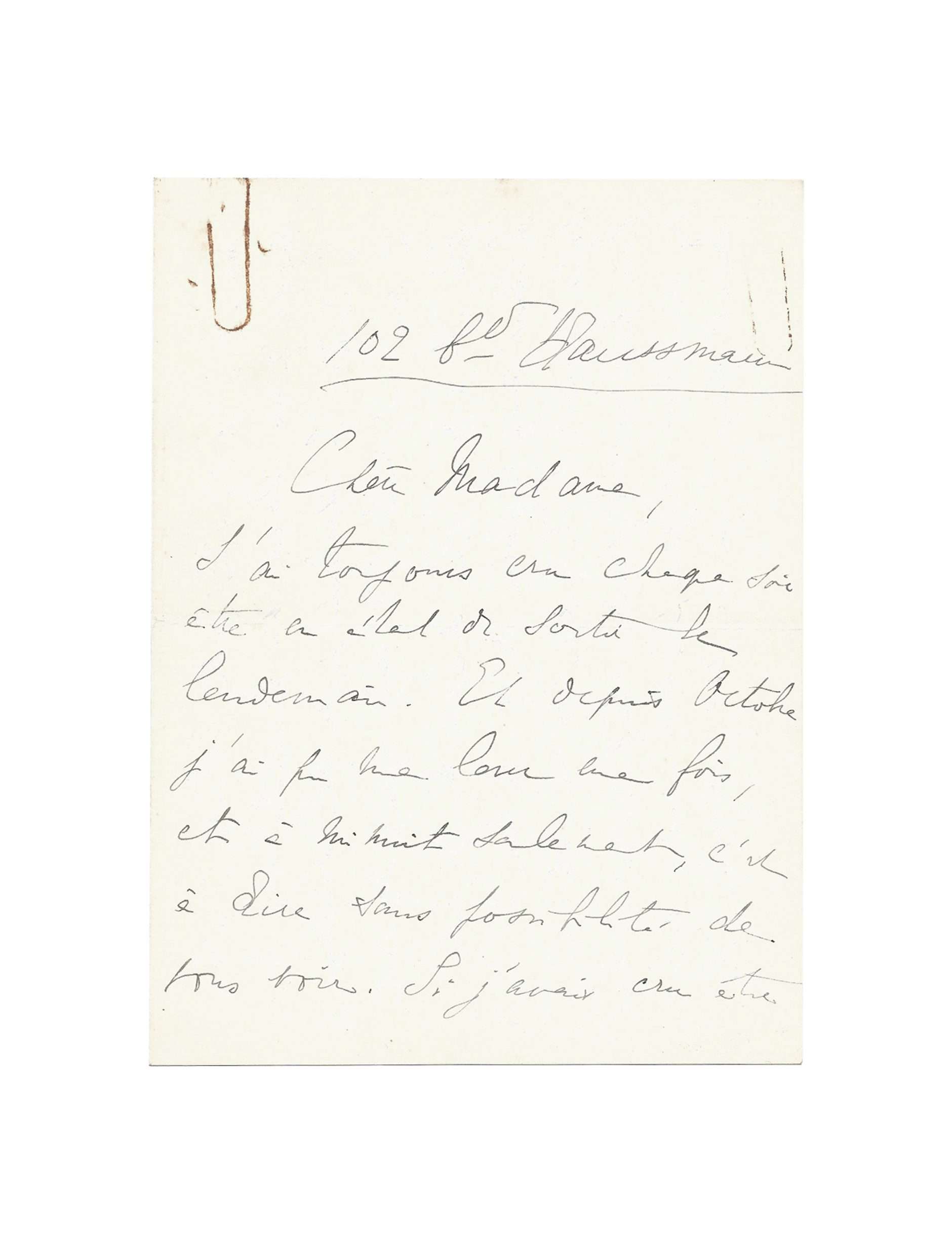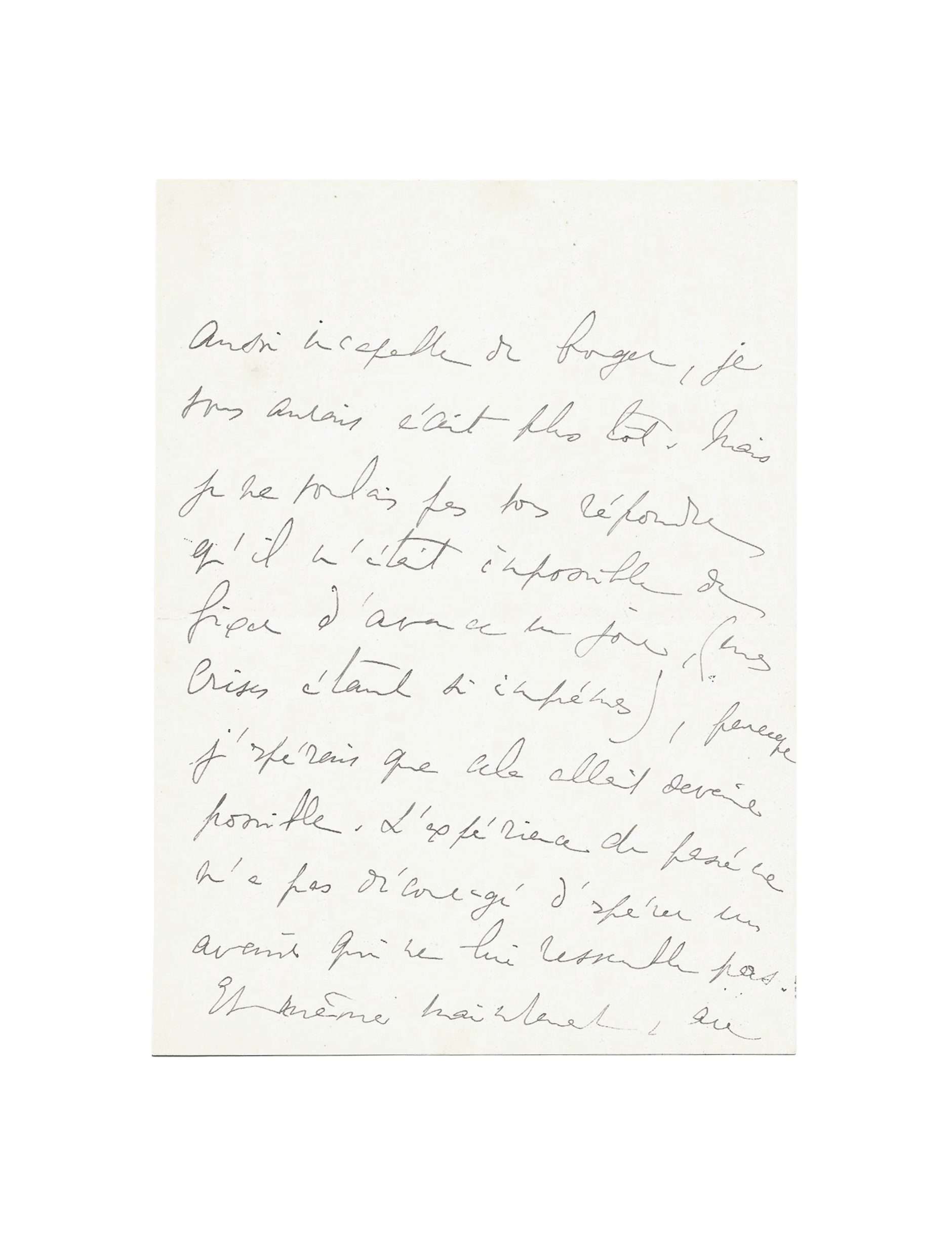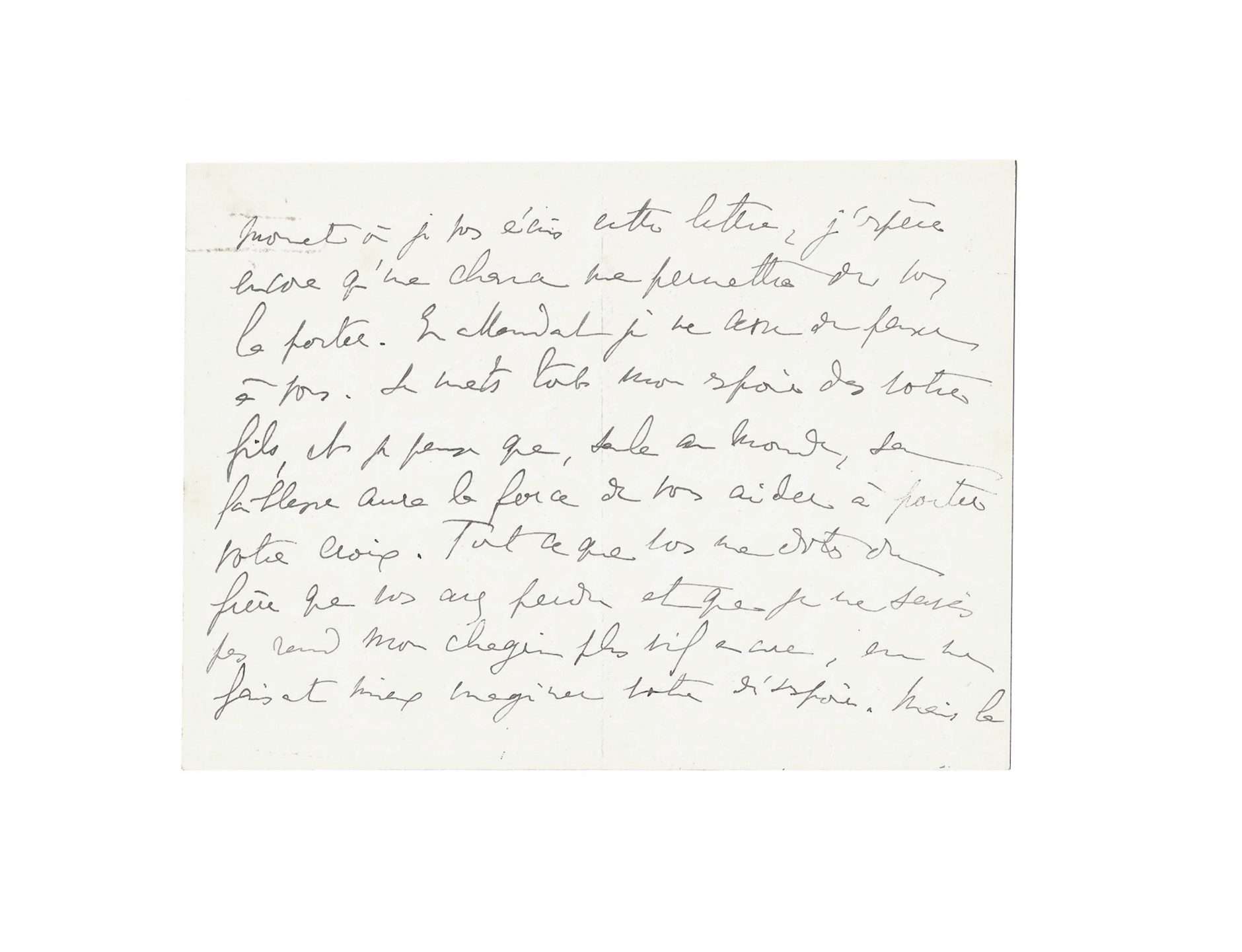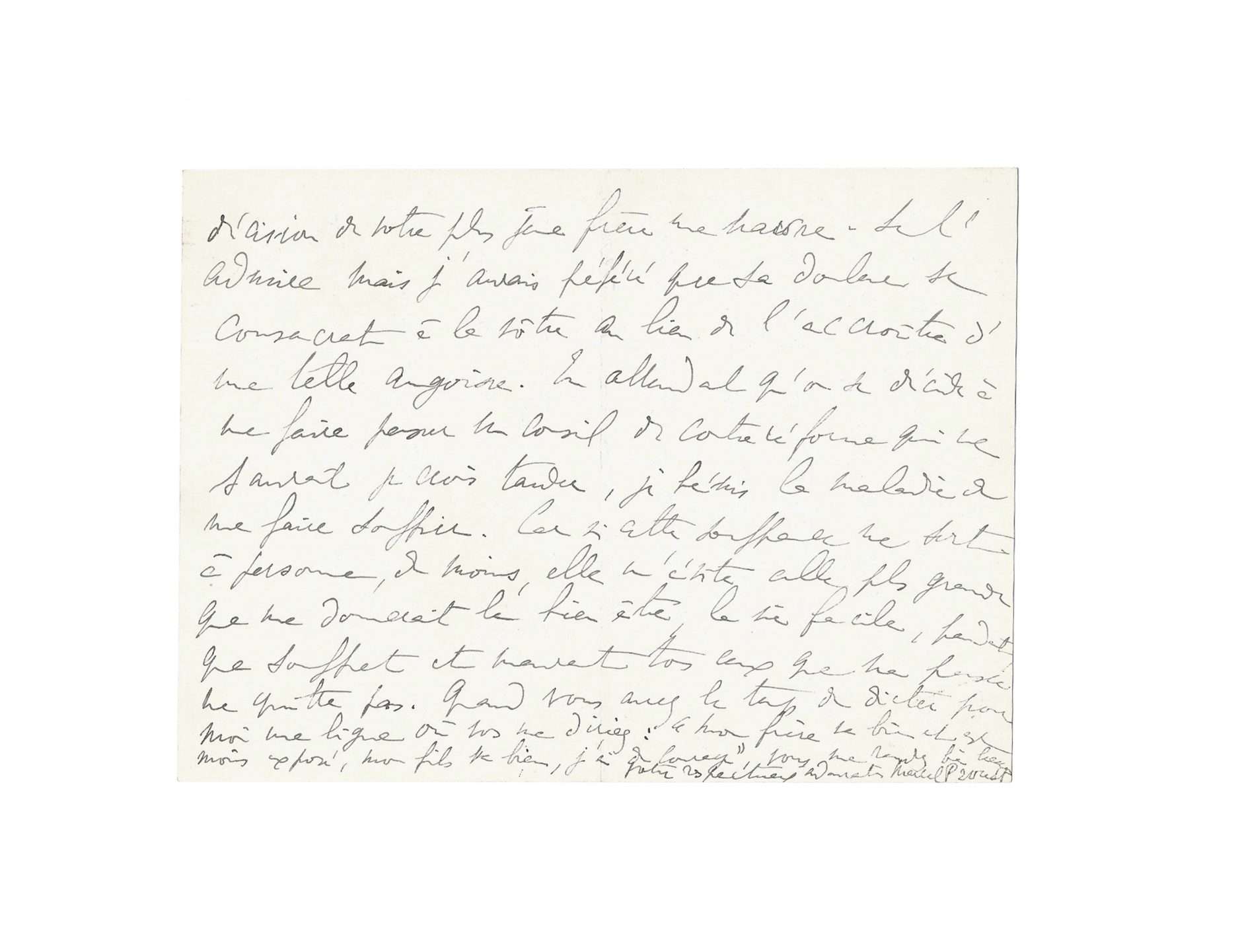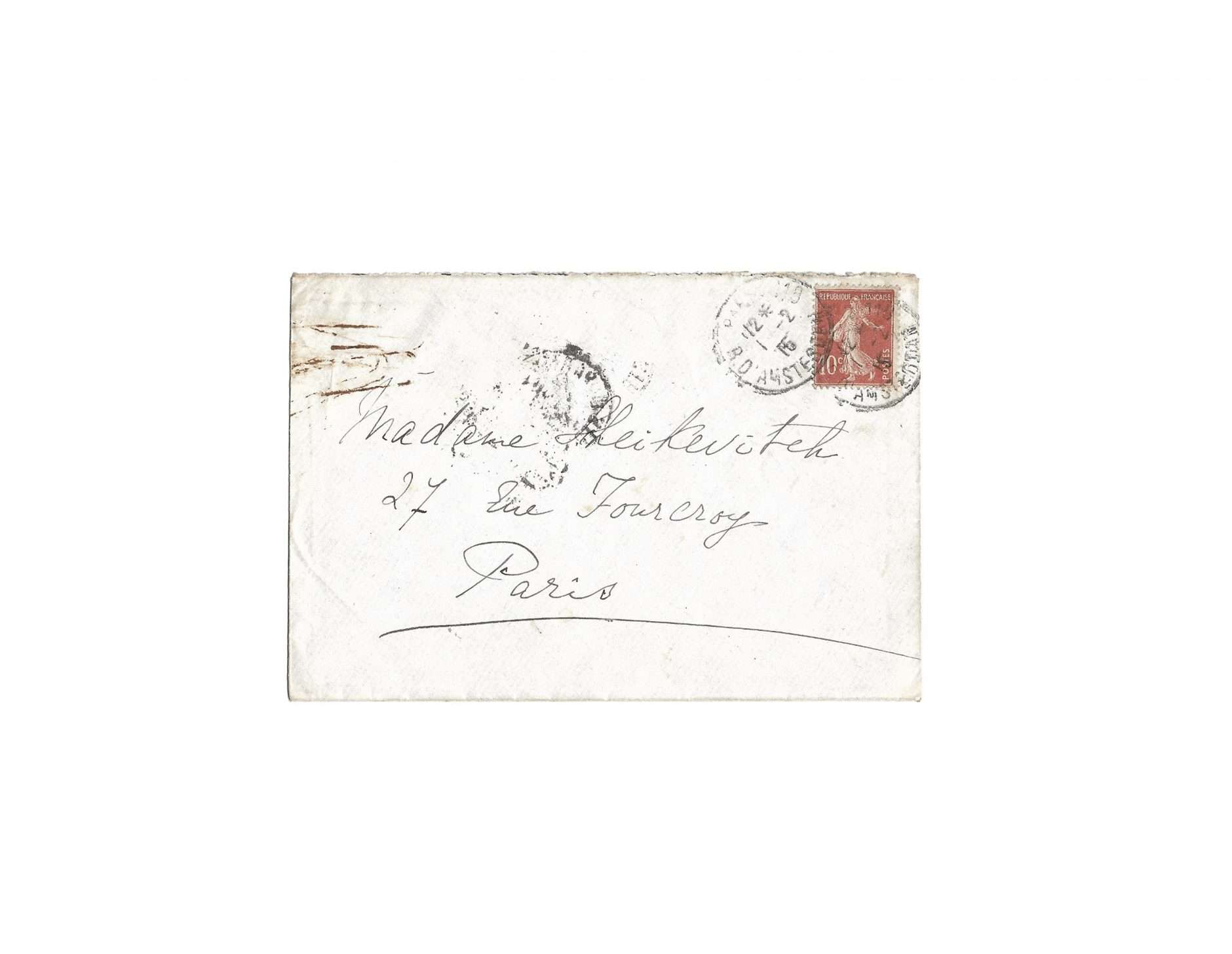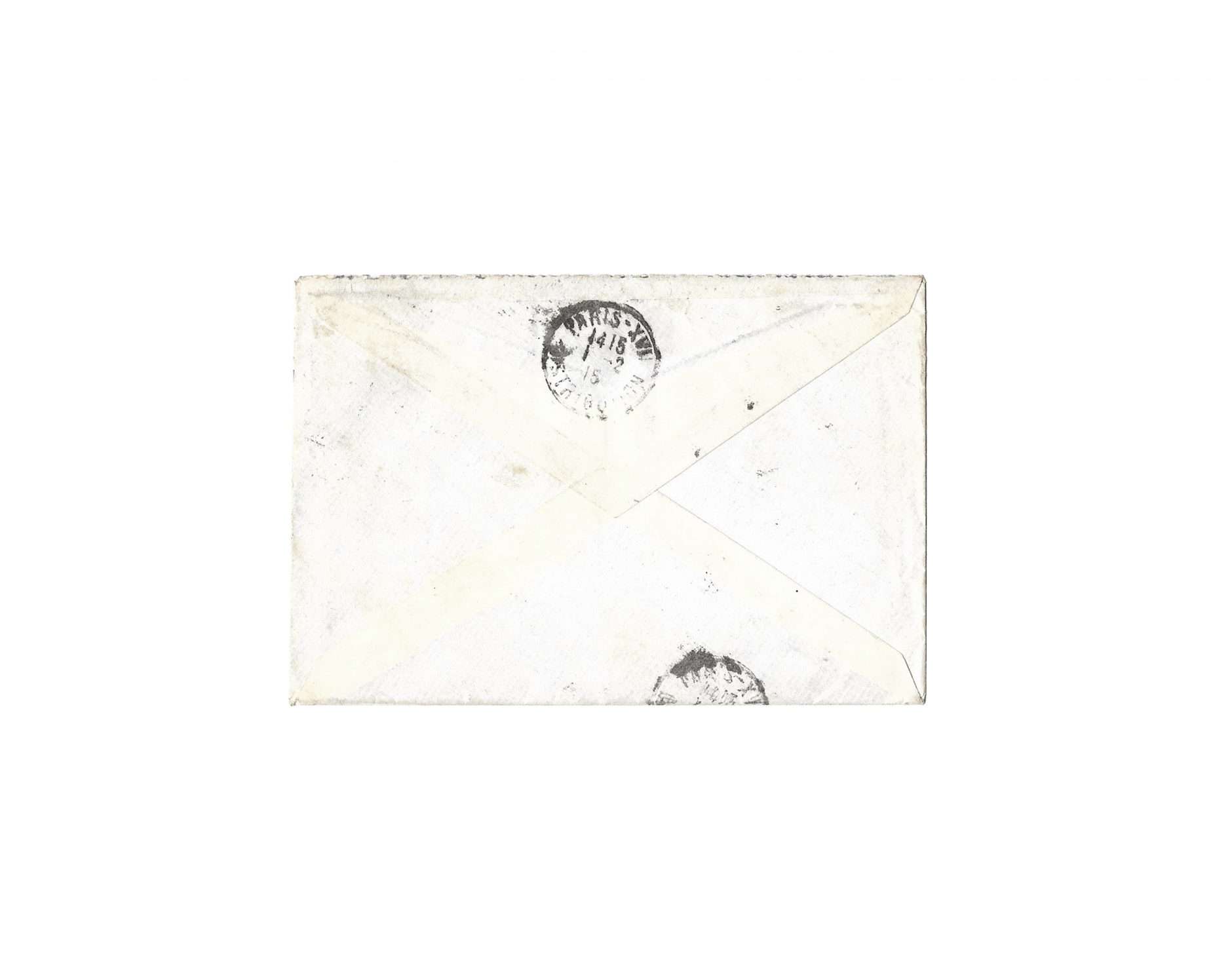PROUST, Marcel (1871-1922)
Autograph letter signed « Marcel Proust » to Marie Scheikévitch
[Paris], 1st February 1915 (post mark), 4 p. in-8° in black in on laid paper
« In the meantime, I can’t stop thinking about you… »
Fact sheet
PROUST, Marcel (1871-1922)
Autograph letter signed « Marcel Proust » to Marie Scheikévitch
[Paris], 102 b[oulevar]d Haussmann, 1st February 1915 (post mark), 4 p. in-8° in black in on laid paper
With autograph envelope
Paper clip marks on upper margin and envelope (see scans)
Proust prefers to suffer in bed rather than lead an “easy life” and thinks of the soldiers mobilized at the front
« Chère Madame,
J’ai toujours cru chaque soir être en état de sortir le lendemain. Et, depuis octobre j’ai pu me lever une fois et à minuit seulement1, c’est à dire sans possibilité de vous voir. Si j’avais cru être aussi incapable de bouger, je vous aurais écrit plus tôt. Mais je ne voulais pas vous répondre qu’il m’était impossible de fixer d’avance un jour (mes crises étant si imprévues), parce que j’espérais que cela allais devenir possible. L’expérience du passé ne m’a pas découragé d’espérer un avenir qui ne lui ressemble pas. Et même maintenant, au moment où je vous écris cette lettre, j’espère encore qu’une chance me permettra de vous la porter.
En attendant, je ne cesse de penser à vous. Je mets tout mon espoir dans votre fils2 et je pense que, seule au monde, sa faiblesse aura la force de vous aider à porter votre croix. Tout ce que vous me dites du frère que vous avez perdu et que je ne savais pas rend mon chagrin plus vif encore, en me faisant mieux imaginer votre désespoir3. Mais la décision de votre plus jeune frère me navre4. Je l’admire. Mais j’aurais préféré que sa douleur se consacrât à la vôtre au lieu de l’accroître d’une telle angoisse.
En attendant qu’on se décide à me faire passer un conseil de contre-réforme qui ne saurait, je crois, tarder, je bénis la maladie de me faire souffrir, car si cette souffrance ne sert à personne, du moins elle m’évite celle plus grande que me donnerait le bien-être, la vie facile, pendant que souffrent et meurent tous ceux que ma pensée ne quitte pas.
Quand vous aurez le temps de dicter pour moi une une ligne où vous me diriez “mon frère va bien et est moins exposé, mon, fils va bien, j’ai du courage”, vous rendrez bien heureux votre respectueux admirateur.
Marcel Proust »
[1] Proust went to Madame Edwards’s house that evening at midnight, as he states in a letter to Lucien Daudet sent the night before.
[2] André Carolus-Duran (1902-1972), son of Marie Scheikévitch
[3] This is one of Mrs. Scheikovich’s brothers, Victor Scheikovich (1885-1914), a lawyer at the Court of Paris, who fell a few days after being proposed as captain, on 15 September 1914, at Tracy-le-Val
[4] Here is the youngest brother of Mrs. Sheikevich, Valentin Sheikevich. He had left as medical officer of a battalion of cyclists, attached along the way to General Lanrezac’s staff, and had just been sent to the front line at his request as surgeon-major of the 2nd Infantry Battalion (Mangin division). He was to be cited at Neuville-Saint-Vaast.
Proust and the War:
This letter was a direct follow-up to the one sent to Marie Scheikovich three weeks earlier, on 9 January. Proust was shocked to learn of the death of Victor Scheikévich, the younger brother of his correspondent, who had been killed at the front in the early hours of the war. He is sorry to know that her younger brother, Valentin Sheikevich, has also been mobilized.
When the war came, the writer was in the middle of writing the sequel to Swann’s way (which had been published in November 1913). He was not called to the front because of illness and followed the progress of the conflict from his Parisian apartment at 102 boulevard Haussmann. The conflict, as we know, had a direct impact on the course of his novel. He turned the church of Combray into a German observatory, which was destroyed by the French and the English.
“Proust was following closely the entire duration of the conflict, in the first place to study the behavior of the society that he frequented during the war. He reads seven newspapers a day, (…) war is a constant concern” (Nathalie Mauriac Dyer)
An intimate of Proust who did much effort in using her network for the publication of the first volume of The Search :
Marie Scheikevitch (1882-1964) was the daughter of a wealthy Russian magistrate and art collector who settled in France in 1896. George D. Painter described her as “one of the smartest and most prominent ladies of the new generation.” Patron of artists and writers, she frequented salons and then founded her own. She was friends with Jean Cocteau, Anna de Noailles, Reynaldo Hahn, the Arman de Caillavet family, among others.
A feeling of singular quality united Marcel Proust to Marie Scheikévitch. Although they met briefly in 1905 in Mme Lemaire’s salon, it was in 1912 that they really get to know eachother. There followed a correspondence that lasted until 1922, the year of the writer’s death. Seeing each other “almost every day” as she would later say (friends writing all the less as they see each other more), we know only 28 letters from Proust addressed to her.
She opened to him the doors of her salon, frequented by all that Paris had of illustrious personalities in literature and arts, so that he paid tribute to her in Sodome et Gomorrhe under the veil of Madame Timoléon d’Amoncourt, “a charming little woman, of a spirit, like her beauty, so ravishing, that only one of the two would have succeeded in pleasing “.
A fervent admirer of the writer, she spent a great deal at the time of the publication of the first volume of The Search, trying everything to put Proust in touch with the Parisian personalities she considered most capable of helping him. It was she who recommended him to her lover Adrien Hébrard, the influential director of the newspaper Le Temps, to obtain the famous interview of November 12, 1913 by Élie-Joseph Bois, on the eve of Swann‘s publication: This was the first significant article published in the major press and devoted to The Search. To thank her, Proust sent her a major inscription (recently acquired by the BnF) when Swann was published.
Provenance:
Catalogue Andrieux, vente du 12 mars 1928, n°175
Bibliography:
Lettres à Madame Scheikévitch (1928), p. 51 – 52
Correspondance, Kolb, t. XIV, n°15
Source:
Marcel Proust II – Biographie, Jean-Yves Tadié, Folio, pp. 391-392
